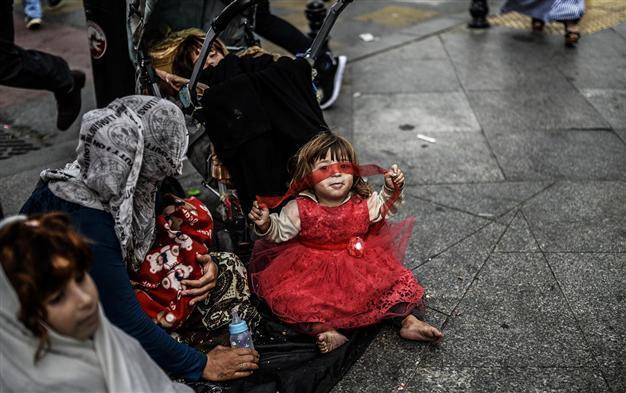Funding woes force UN to slash rations for 4 million of Syrians
GENEVA - Reuters

A Syrian woman with her four children sits begging in the street on Sept. 17, in Istanbul. AFP Photo / Bülent Kılıç
The United Nations will have to slash food rations to four million Syrians by 40 percent in October due to a shortage of funds, despite better access to areas in need, a senior U.N. aid official has said.John Ging, director of operations at the U.N. Office for Coordination of Humanitarian Affairs, said in an interview that the “break in the pipeline” means greater hunger as a fourth winter of the Syrian civil war sets in. A record 4.1 million people in Syria received rations in August as more convoys were able to cross front lines and borders from Turkey and Jordan, the U.N.’s World Food Program (WFP) said this month.
“In October, WFP will be able to deliver 60 percent of what they have been delivering. In November it will be down to 40 percent,” Ging told Reuters in Geneva after attending an unannounced meeting on humanitarian aid to Syria.
“It is because the money is not coming in. This is devastating news for people who are aid-dependent,” he said. A WFP official told the closed-door talks that in November the food basket for Syrians could shrink to 825 calories, well under half the daily recommended intake, diplomats said. Deep cuts also loomed for many of the three million Syrian refugees in Lebanon, Jordan, Turkey and Iraq. There is a three month lag between the time food supplies are purchased and delivered on the ground, Ging said. “This will come at a time when the suffering is exacerbated by winter. “So we will find humanitarian agencies cutting down on aid deliveries when aid is needed more than ever,” he said. “It is not just food, it is vital shelter material, clothing and supplies for water and sanitation.”
The WFP requires $44 million for its immediate operations in Syria, Ging said. A further $56 million is needed to avoid cuts in food assistance in neighboring countries, diplomats said. Yacoub El Hillo, U.N. resident coordinator in Damascus, told Reuters after attending the talks that the lack of funds had created a “really critical situation.” “Syria is the most complex and most urgent and largest operation, but it is one of many. Donors are able to do so much,” he said, noting competing pressures for funding. Diplomats from Western donor countries, as well as Syria’s allies Iran and Russia attended the discussions.
Cross-border operations
In July, the U.N. Security Council authorized the delivery of emergency aid across the Syrian border without the consent of Damascus. To date there have been 14 U.N. convoys that have entered Syria via Turkey and Jordan, Ging said.
“We have been gaining access for the first time to some besieged and hard to reach areas we have never been able to reach before. We have more access opportunities, but are not able to scale up because of funding. You can’t deliver what you don’t have.”
Syrian ambassador Houssam Eldin Alaa told the talks: “We heard today that under funding remains the main obstacle to providing humanitarian aid to Syrians. The countries that are used to boasting in their statements about their will to donate funds have not done so and this must be admitted.” Cross-border aid, often presented as the “magic solution”, amounts to only two or three percent of the total aid provided, he said in the text of a speech obtained by Reuters. He said sanctions against Syria’s banking sector had hurt the provision of basic needs, while “terrorist groups” – an apparent reference to Islamic State forces who control swathes of both Syria and Iraq – had disrupted access to certain areas. El Hillo said: “Access is still a problem, but it is much better than we were seeing in June. But we’re not there yet.
Claus Sorensen, director of the European Union’s humanitarian aid department ECHO, said cross-border operations accounted for 30 percent of EU aid reaching Syria.
“There are vast areas with no access. Millions are living in areas under ISIS-control, a big caseload is out of reach. “The funding issue is a challenge for all of us. With Ebola, South Sudan and the Central African Republic, the caseload is huge. It is difficult, but there is a willingness to step up to the plate.”
















